Zinc & Quercetin alternative to Hydroxychloroquine for Prevention of COVID-19?

This post was written back at the start of the pandemic and is now really out of date – please see updated posts for newer research.
I’m not sure this will work but want to share what I found anyway to anyone who is interested. (Contact me privately if you want all the research so far). In bold here is my summary (and below the bold writing is the research) and you know I’m not an expert, just sharing what I found & what I’m looking at.
So first I looked into hydroxychloroquine (Hydroxychloroquine is the malaria drug that is being used successfully against COVID-19) and why Trump is wanting people to take it. I learned what it does and why it could be the cure. Problem is, it can only be prescribed – it’s not natural, it’s not something you can take as a preventative because it has lots of bad side-effects etc..
I don’t know why this isn’t mentioned in the media, but it seems the reason it’s working is because it gets zinc into the cells which stops the virus from being able to penetrate the cells.
So the basic way to understand it (and you can watch all the videos below and read the articles to get the full detailed explanation), is that the virus can directly enter our cells, and Zinc can stop the virus from entering the cells but Zinc can’t enter our cells to be able to protect from virus without something else to carry the zinc into the cells. (In their case, Hydroxychloroquine, but that started me wondering about any other alternatives to this pretty strong prescription-only drug), and I think that what we can do as a preventative, without that drug is possibly use quercetin instead which is found naturally in most fresh foods and also available as a supplement.
…. (and if you have found anything else that can do this in your research, please share, I’ve only spent about 12 hours on this – there’s probably heaps that I’ve missed and this isn’t my area of expertize).
It could be beneficial to up our quercetin food intake (which we should be doing anyway in daily life, not just for this virus). Quercetin foods is in lots of natural foods including:
- granny smith green apples
- red onions
- broccoli
- green tea
- blueberries
- elderberries, etc.
It’s “at least something we can do at home” as a semi-alternative/preventative to Hydroxychloroquine, to “hopefully (since there is not much research) – make zinc available to our cells.
And, since zinc is needed in our cells to prevent the virus from entering, we can also increase zinc foods;
(although it seems that you can’t really increase it much unless you want to add oysters to your daily diet)
- Grass-fed red meat
- sesame seeds
- pumpkin seeds
- lentils
- garbanzo beans
- cashews
- turkey
- quinoa
- shrimp
But it seems that if we really want to up depleted zinc levels (especially if you have elderly friends that you want to protect from the virus), we would need to supplement the zinc – (but not overdo it because too much zinc depletes the body of other minerals, especially copper).
The zinc supplement should be:
- zinc gluconate
- zinc picolinate
- or zinc acetate
- (and NOT zinc oxide).
In addition to the hydroxychloroquine/zinc combination in the treating 24 patients who had the virus, a doctor (in the first video) added the following (so probably not a terrible idea to increase these in our daily diets):
- vitamin c 2000mg
- vitamin d3 5000IU
- zinc 15mg
- copper 1mg
(Remember these are dosages he prescribed for those who are already diagnosed with COVID-19 or have the symptoms, not dosages for prevention, which should be a lot less).
Now to the research:
Source:
07 Apr 2020
Hydroxychloroquine treatment for Covid 19 Case Studies for Doctors Doc Talk
https://youtu.be/r5ThZ5kzOFc
That video was removed, but here it is on a different channel: https://youtu.be/Q7voUXgMCSs
That video was also friggin removed – this fucking censorship is absolutely criminal. I found a copy of it here https://youtu.be/1aNl6LcKukk but suspect that it will also get deleted as well.
This video goes through every patient this doctor has had one-by-one with COVID-19 symptoms and what he has tried with each of them and how quickly they recovered (or not). Probably the most interesting for me the fact that he treated a 90yo female with pre-existing lung issues!
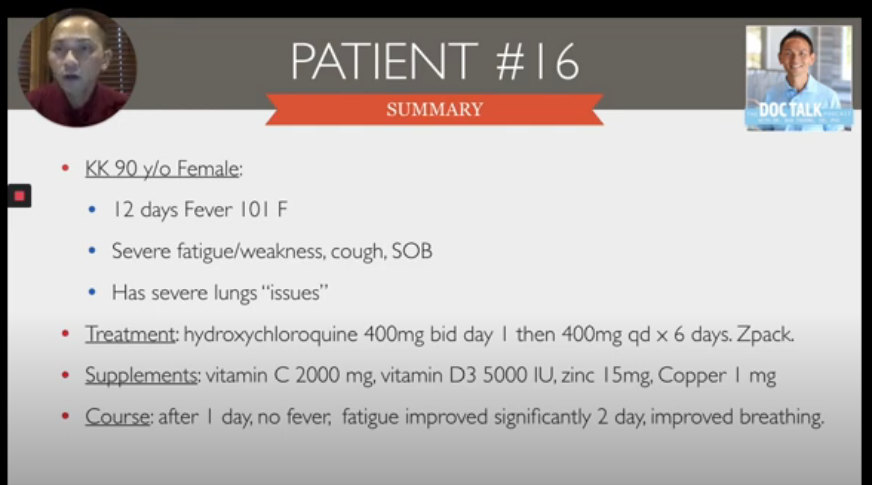
He goes through every patient one-by-one in his video:
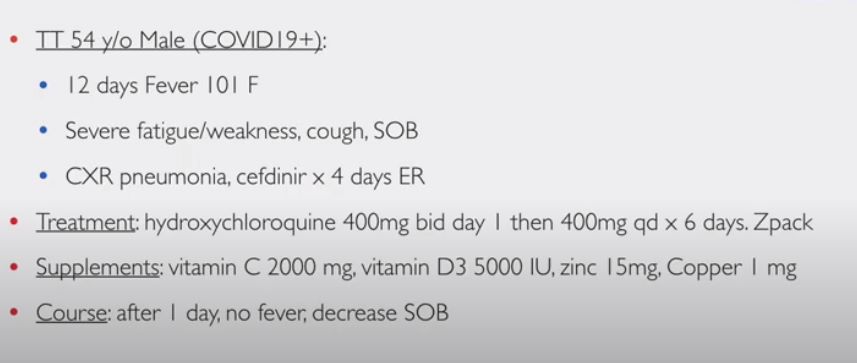
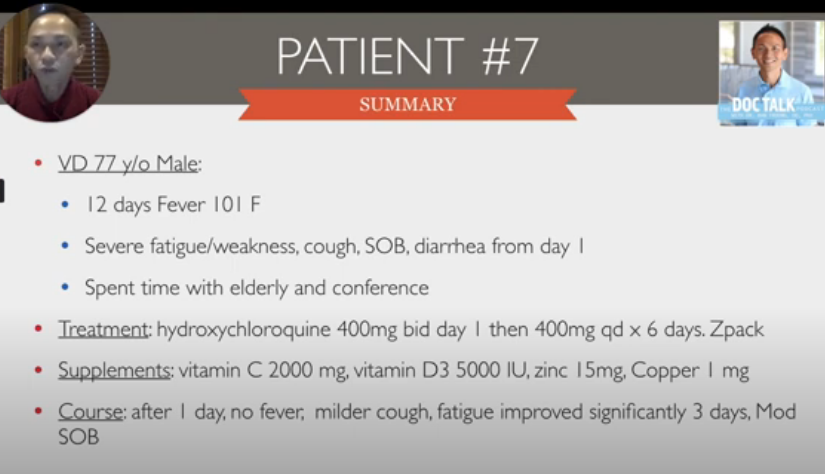
If they start this early on, they recover fast (1 day).
On a different video, it explains how zinc inhibits coronavirus.. and they reference this study:
Nov 04 2010
Zn2+ Inhibits Coronavirus and Arterivirus RNA Polymerase Activity In Vitro and Zinc Ionophores Block the Replication of These Viruses in Cell Culture
This video explains how it works:
19 Mar 2020
COVID-19 Update 8: Zinc and chloroquine for the treatment of COVID-19? https://youtu.be/BIymfznD7YA Basically zinc can’t penetrate the cell without an ionophore, chloroquine is a zinc ionophore which carries the zinc to the cell)
Chloroquine Is a Zinc Ionophore
https://journals.plos.org/plosone/article?id=10.1371/journal.pone.0109180
Chloroquine (CQ) was first used as prophylaxis and treatment for malaria. Hydroxychloroquine (HCQ) is a more soluble and less toxic metabolite of chloroquine, which causes less side effects and is, therefore, safer (1-3).
Chloroquine and hydroxychloroquine: Current evidence for their effectiveness in treating COVID-19
https://www.cebm.net/covid-19/chloroquine-and-hydroxychloroquine-current-evidence-for-their-effectiveness-in-treating-covid-19/
An interesting article… “Symptoms of coronavirus infections almost perfectly mirror symptoms of zinc deficiency” (perhaps those who are contracting the virus are deficient in zinc)
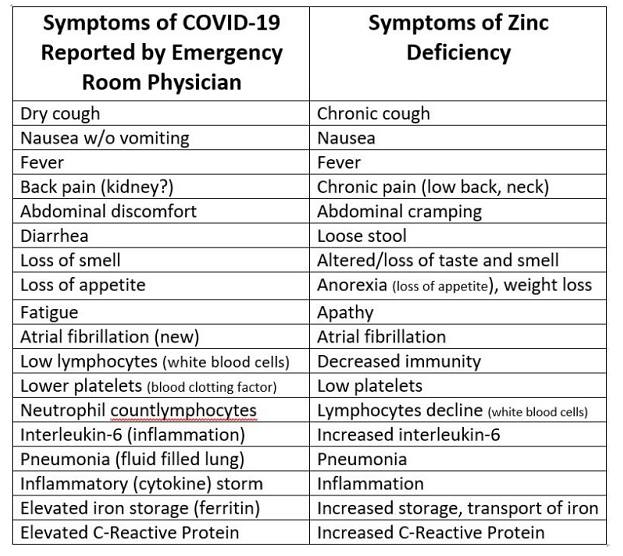
The best forms of zinc to consume as a dietary supplement are zinc gluconate, picolinate and acetate. Avoid zinc oxide, as it’s almost impossible to absorb.
What if the cure for the coronavirus were as simple as taking zinc? https://www.naturalnews.com/2020-03-30-what-if-cure-for-coronavirus-as-simple-as-taking-zinc.html
Now I’m trying to find a natural zinc ionophore & natural zinc intake (like pumpkin seeds).
Quercetin is a flavonoid (a type of polyphenol) that’s present in a variety of edible plants – from herbs like cilantro and dill, to veggies and fruit such as onion, kale and cranberries, with the highest concentration found in capers. Quercetin was demonstrated to be a zinc ionophore in 2014.
But there’s only ONE paper that I could find that specifically tests Quercetin as a zinc ionphore – so not a lot of studies have been done, which is the reason why it’s more of a ‘guess’ whether it will work than something proven (like chloroquine), but there is a list of similar studies that makes me think that it should work:
See https://scholar.google.com.au/scholar?hl=en&as_sdt=0%2C5&as_vis=1&q=Quercetin+zinc+&btnG=
Bottom line: should you eat quercetin-rich foods? I feel comfortable with the idea of eating zinc-rich foods that also qualify as healthy foods (e.g., seeds, legumes, mushrooms, and spinach). I’m somewhat comfortable with doing the same for foods that are moderately rich in quercetin (e.g., kale, onions, peppers, and elderberry juice).
The one thing that gives me pause is that consumption of the most quercetin-rich food, capers, is high in the countries where COVID-19 has a strong mortality rate: Italy, Spain, France and Iran. I know – there are myriad reasons why these countries are more strongly impacted. I also know that some of the above is merely armchair science. But I figure that it’s useful to share thoughts in case they spark an idea or study that can take us a little closer to a treatment.
Source: https://greenstarsproject.org/2020/03/27/quercetin-a-treatment-for-coronavirus/
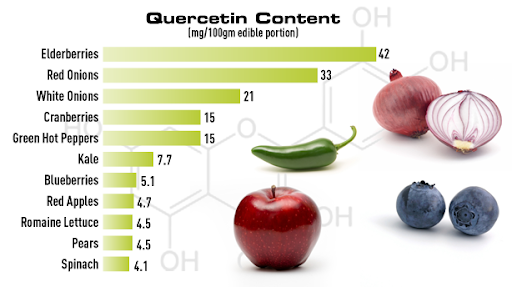
World’s Healthiest Foods rich in zinc http://www.whfoods.com/genpage.php?tname=nutrient&dbid=115
ZINC: No individual food ranks as an excellent source of this mineral.
Only five foods rank as ‘very good’ sources, and 24 foods rank as ‘good’ sources of zinc. If you are seeking to increase your dietary intake of zinc, this limited number of ranked foods means that you cannot count on any particular food to obtain your 11 milligrams of daily zinc.
>>>>>> It appears that elderly individuals are especially prone to developing reduced immunity related to poor zinc nutrition. Even in this at-risk population, restoring zinc status appears to reverse the detrimental changes within weeks.
The most well-known fact about zinc in foods is almost certainly that oysters are rich in zinc. A typical oyster weighing approximately one ounce will contain about 8-9 milligrams of zinc. So two oysters would put you over the WHFoods recommended daily amount of 11 milligrams.
In addition to oysters, other shellfish tend to be rich in this mineral, as are many other animal foods.
Too much zinc in the diet or from dietary supplements can impair copper nutrition. Focus on foods that are strong sources of both copper and zinc. Sesame seeds and pumpkin seeds would be good examples of these.

Food Sources of Quercetin
Foods rich in isoquercitrin include:
- leafy vegetables
- broccoli
- red onions
- peppers
- apples
- grapes
- black tea
- green tea
- red wine
Some of the most commonly consumed quercetin foods include:
- apples
- onions
- green peppers
- red leaf lettuce
- asparagus
- broccoli
- grapes
- beans
- tomatoes
Black and green teas are also good sources.
But by far the richest source of quercetin is capers. Although they look like berries, capers are actually tiny flower buds that grow on shrubs throughout the Mediterranean region.
According to data collected by the USDA, raw capers provide 234 milligrams of quercetin per 100 grams (3.5 ounces). Canned capers in brine — as they are commonly eaten — provide 173 milligrams of quercetin. (But beware of high sodium content of capers)
In comparison, 3.5 ounces of raw onions provide 39 milligrams, and the same amount of boiled asparagus has 15 milligrams, according to the USDA.
Vitamin C
Foods rich in vitamin C include:
- broccoli
- cantaloupe
- cauliflower
- kale
- kiwi
- orange juice
- papaya
- red, green or yellow pepper
- sweet potato
- strawberries
- tomatoes
See also:
(Updated today 14th April 2020)
07 Apr 2020
The Functional Medicine Approach to COVID-19: Virus-Specific Nutraceutical and Botanical Agents
https://www.ifm.org/news-insights/the-functional-medicine-approach-to-covid-19-virus-specific-nutraceutical-and-botanical-agents/
11 Apr 2020
Quercetin as Zinc Ionophore and COVID-19 Outpatient Management (holy crap.. a doctor came to the same conclusion & questions as I did about using Quercetin & Zinc!)
https://youtu.be/W9YFXo84lCk
+ Hydroxychloroquine + Azithromycin + Zinc + Quercitin + Vitamin C + Vitamin D
If I’m wrong about any of this, there’s nothing unhealthy in this advice in general, as long as noone is using this as their own “cure” if they already have the virus, but just as general information that Penny found that might be helpful.

Site Notifications/Chat:
- Telegram Post Updates @JourneyToABetterLife (channel)
- Telegram Chatroom @JourneyBetterLifeCHAT (say hi / share info)
- Gettr Post Updates @chesaus (like fakebook)
Videos:






![[Solutions] Serene Teffaha – CoVision](https://pennybutler.com/wp-content/uploads/2023/04/Serene-Covision.jpg)